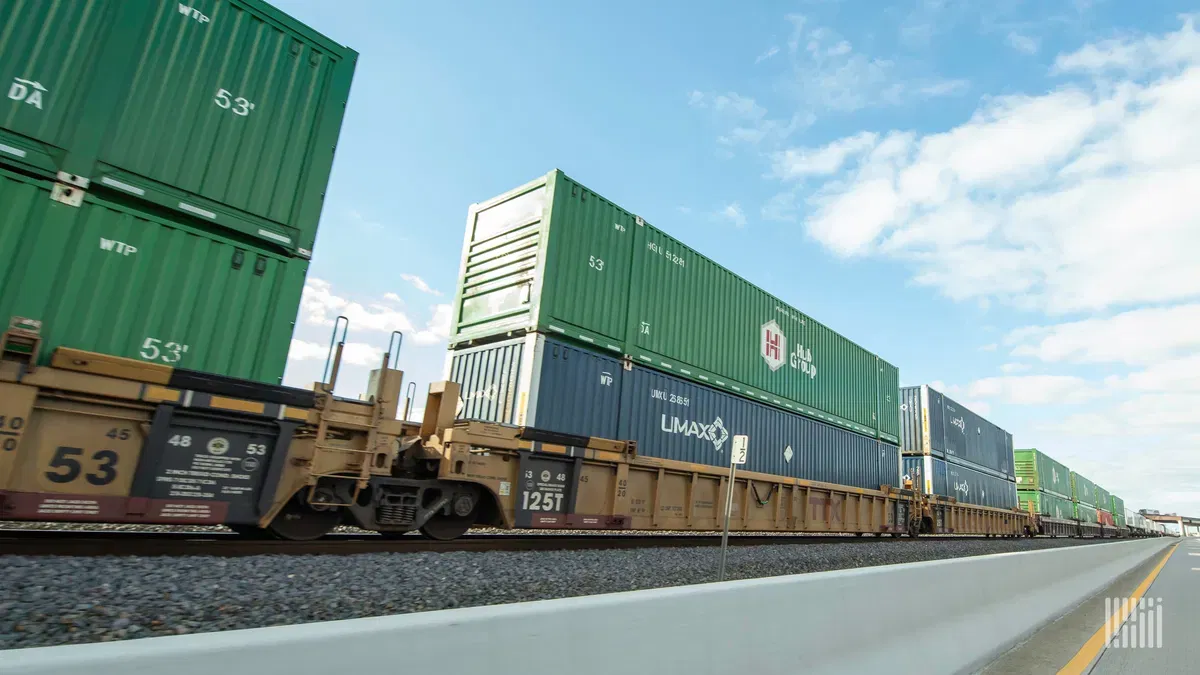Цепочка поставок США под давлением
Недавние изменения тарифов внесли сумятицу в отечественную цепь поставок США, вызвав заметную нагрузку на железнодорожные перевозки. ITS Logistics Индекс грузоперевозок через порты/железнодорожные рампы США сыграла важную роль в освещении проблем, с которыми в настоящее время сталкиваются железнодорожные рампы, подтвердив заметное снижение объемов импорта после повышения тарифов на товары из определенных стран.
Прогнозирование нагрузки на железнодорожные объекты
Майский прогноз отражает ранее ожидаемое резкое падение уровня импорта, особенно в отношении товаров, отправленных из Китая. Эта ситуация привела к увеличению загруженности на стратегических железнодорожных объектах, поскольку грузоотправители адаптируют свои логистические стратегии. Переход к использованию внутриконтинентальной интермодальной маршрутизации (IPI) для управления предварительно загруженными запасами выявил ряд новых операционных проблем, одновременно обнажив уязвимости в цепочке поставок.
Операционные вызовы в ключевых регионах
В частности, железнодорожные рампы, расположенные в таких мегаполисах, как Чикаго, Мемфис, Нэшвилл, Луисвилл, Атланта, Колумбус и Торонто, испытывают значительное оперативное давление. Этот всплеск спроса продолжает выявлять критические недостатки в существующих логистических структурах.
Штатная работа в условиях региональной напряженности
И наоборот, рампы, расположенные в Атлантический, Тихий океан, Western, и Залив регионы справляются с поддержанием нормального уровня работы, демонстрируя, что не все области затронуты в равной степени. Тем не менее, общие тенденции указывают на переоценку текущих логистических стратегий в ответ на продолжающиеся изменения рынка.
Растущая Озабоченность: Тенденции Краж Грузов
В течение 2025 года ожидается, что отрасль столкнется с ростом обеспокоенности по поводу краж грузов, что является тревожной тенденцией, подтверждаемой последними данными индекса. Повышенные показатели краж могут усугубить трудности, уже влияющие на железнодорожные перевозки, еще больше нарушая цепочки поставок и увеличивая операционную нагрузку. Решение этих проблем путем усиления мер безопасности будет иметь решающее значение для заинтересованных сторон во всем логистическом спектре.
Корректировки логистической стратегии
По мере того как грузоотправители меняют свои стратегии, чтобы справиться с этими проблемами, интермодальная логистика, вероятно, станет более сложной. Способность легко перегружать товары между различными видами транспорта может оказаться решающим фактором в смягчении перебоев в цепочке поставок. Будущие тенденции могут во все большей степени включать в себя технология и улучшенные методы анализа данных для решения этих оперативных проблем.
Воздействие на логистику
Корректировки, вносимые в работу железнодорожного транспорта, имеют значительные последствия для логистической отрасли в целом. Хорошо функционирующая железнодорожная сеть необходима для эффективного перемещения товаров; сбои — даже временные — могут привести к далеко идущим последствиям. Для компаний, занимающихся логистикой, сигнал ясен: адаптация к меняющимся условиям будет иметь решающее значение для поддержания деятельности.
Подготовка к будущим изменениям
Для поддержания конкурентного преимущества логистическим компаниям необходимо повысить прозрачность своей деятельности. Этого можно достичь за счет улучшения коммуникации между заинтересованными сторонами, последовательного мониторинга тенденций и использования передовых технологий для аналитики в режиме реального времени. Кроме того, сосредоточение внимания на развитии прочных отношений с операторами железнодорожных перевозок может способствовать более плавному переходу в периоды пиковых нагрузок или возникновения проблем.
Заключение
In summary, the Отчет ITS Logistics раскрывает многогранные проблемы, которые корректировки тарифов привнесли в работу американских железнодорожных терминалов. С падением объемов импорта и ростом случаев краж грузов, нагрузка на железнодорожные операции ощутима. Компаниям в сфере логистики следует эффективно подготовиться к этим изменениям, чтобы оптимизировать свою сеть и качество обслуживания. GetTransport.com предлагает ценный ресурс для предприятий, которые ищут надежные и доступные решения для международных грузоперевозок. Платформа легко связывает пользователей с различными вариантами доставки, чтобы удовлетворить разнообразные потребности, будь то переезд офиса или дома, или транспортировка крупногабаритных предметов.
В конечном счете, нюансы логистики требуют от компаний быть на шаг впереди. Постоянная оценка рыночных условий и адаптация стратегий будут иметь решающее значение для решения возникающих проблем. Надежная информация и своевременное принятие решений открывают путь к улучшению показателей по всем видам транспорта. Планирование ваших транспортных потребностей сейчас более достижимо, чем когда-либо — рассмотрите услуги GetTransport.com чтобы оптимизировать ваши логистические операции. Забронировать сейчас на GetTransport.com.

 Нагрузка на американские железные дороги возрастает из-за корректировки тарифов и увеличения импорта">
Нагрузка на американские железные дороги возрастает из-за корректировки тарифов и увеличения импорта">